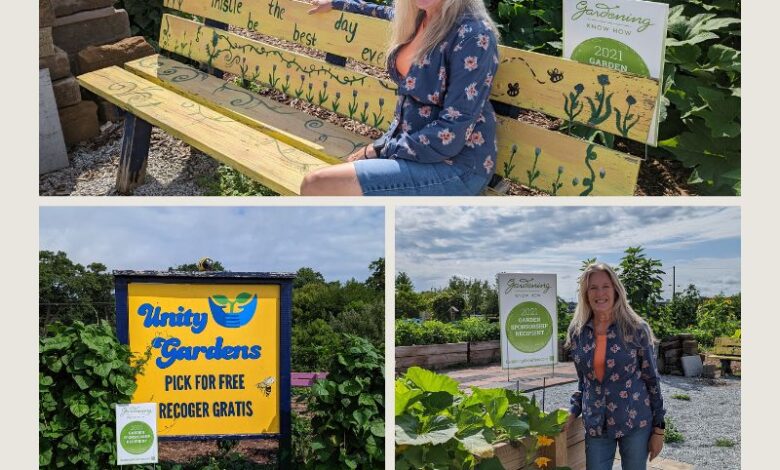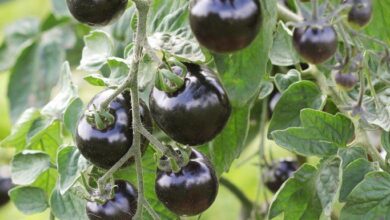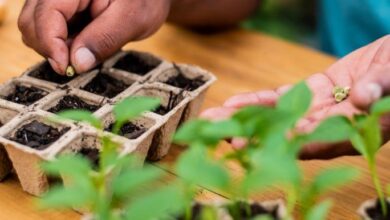
Sponsorship 2021 – Unity Gardens
[ad_1]
“They call it all different things, like paradise, sanctuary. It’s a beautiful thing.“
–John, Unity Gardens
It’s a challenge to describe Sara Stewart. Perhaps a good start would be to mention that she is a “Best of Humankind” award recipient for her creation of Unity Gardens in South Bend, Indiana.
Sara observed a culture of multi-generational poverty; people not looking forward to the future who were stuck in crises and juggling just to survive. South Bend Indiana is home to Notre Dame College, but there are areas of abandoned factories, a high level of poverty and crime, with vacant and abandoned businesses and houses. But, there were 7 acres in a neighborhood of 100%-subsidized housing that were destined to become prolific.
Acutely aware that consumption of fat-filled, unhealthy foods was leading to the very diseases she was treating every day in her work as a nurse, coupled with her master’s thesis on poverty, Sara was inspired to make a change. A big change. There in the heart of the country/s lush farm belt, she saw no reason for anyone to be undernourished or lacking fresh food. She had a true “aha” moment realizing it was possible to build a model to truly create wellness — physically, socially economically. Her goals in founding Unity Gardens were quite elevated and lofty, and would seem unreachable to most. However, her respect for humanity and for individual dignity made this grand project a reality:
Unity Gardens’ mission is to improve community health: Physically by increasing accessibility of fruits and vegetables as well as providing education on nutrition and food preparation. Socially by providing education, increased social capital, and opportunities for the disadvantaged. Economically by developing a sustainable local food system, recapturing food waste, creating new jobs, and increasing per-capita productivity.
Unity Gardens Comes to Life
Sara began emailing potential collaborators with her ideas for the model that was forming. Her email list went from 5 to 1200 by the end of that first year. By the following year there were 12 non-profit Unity Garden locations. Grants and donations go through the main organization that supports the other 44 neighborhood Unity Gardens. Food, seeds, plants and financial support are generously donated and dispersed.
Local media coverage has kept the project in the news since its inception. Sara notes that 2022 has been unique. In 2021 they were still in need of growing more food and fundraising. This year they’re completing the onsite infrastructure of a parking lot, a Welcome Center and a 4-Seasons Geo-dome. A building has been constructed and there are now handicap and inclusion gardens underway. On seven acres an entire ecosystem has been created and Unity Gardens is launching into the international spotlight.
The Program Blossoms
Over time, the project has grown to include many opportunities and activities. Funds are raised through produce sales at farmer’s market, as well as the creation and sale of some delicious by-products.
Unity’s bees won in state and national levels for the best “Honey from the Hood.” Unity Gardens Market booths also sell other honey products, such as habanero-infused honey, honey soaps, beeswax candles, hot sauces and ketchup, to name just a few.
Neighborhood gardens have sprung up throughout the county and beyond as this project continues to grow. Most work in the individual gardens is done by volunteers, although Unity provides guidance, seeds, plants and materials.
Unity Gardens holds a free two-week gardening day-camp offering lessons, free play, and lunches. The garden camp was attended by 215 kids before the pandemic. With a recent grant from “Lush Cosmetics” that supports the building infrastructure, there will be self-guided activity stations. Kids can cut out flowers, make bug nets, learn about natives, wildflowers and monarchs. They can roam a discovery garden looking for ladybugs and discover magical garden elements in small special areas designed for young garden explorers. The facility has a tasting station where chefs can demonstrate recipes. Again, the experiences, education and everything offered in the building is free.
Unity also employs full time garden guides. There is an entire paid staff here and, unless they are otherwise sponsored, the interns are also paid. The only charge at Unity Gardens is what the year-round Farm Market area produces, which is sold to support the free pick gardens and programs.
At Unity Gardens there is no requirement for visitors to be low income, unemployed or underserved. Any and all individual and diverse groups are welcome to come and pick fresh vegetables, visit with the chickens and goats and learn about gardening and nutrition at this 7 acre farm. There is enough food for everyone, and everything is free.
Passing the Torch
Sara admits she has taken risks. She has expended tremendous energy over time creating and developing Unity Gardens. As she begins her retirement journey she’ll pass along her amazing legacy to two managers who were previous neighborhood garden leaders, and are people who feel that this value-oriented work is right for them. Sara Stewart has selflessly generated hope and sustenance in a region where a sense of community, simple nourishing food and healthy activity can make a huge difference in the lives of many. Sara has spread a light of hope and equanimity through sharing, patient energy and purity of intention. We are so grateful for the example she has set. If you would like to support Unity Gardens, click here for more information.
Every year, Gardening Know How awards $1,000 to 20 different, hand-picked garden projects across the United States and Canada. If your community or school garden has a growing, unmet need for more soil, seeds, fertilizers, building materials, or even just help getting the word out about your program, we’re ready and willing to help you meet those needs. As community gardens and school gardening programs spring up all over, we’re happy to do our part to help.
[ad_2]







